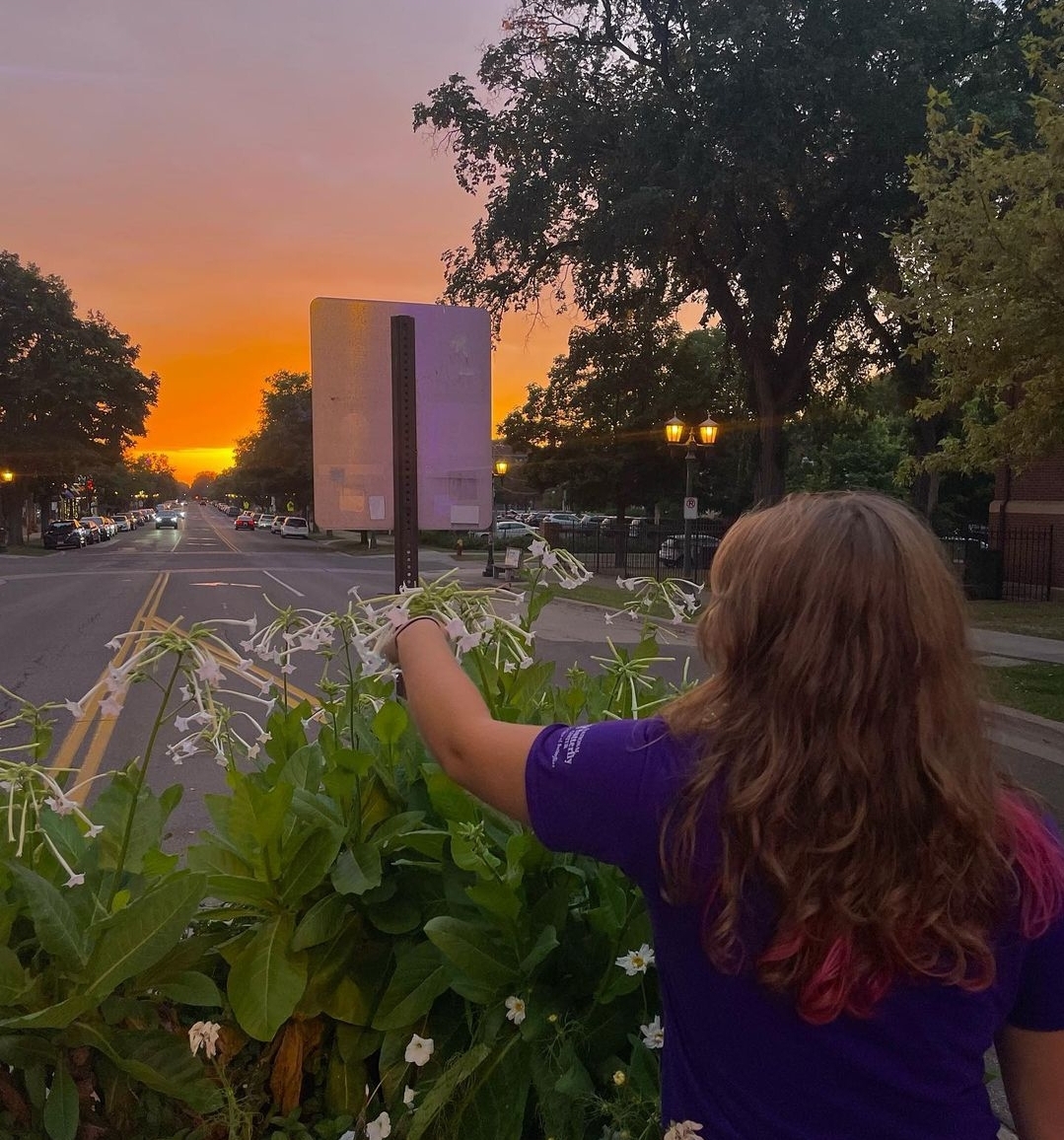Normally when it gets like this, when everything stable comes crumbling down with a sentence, when the world ends, I can go into the forest behind my childhood home and start to feel better. But I’m not in New Hampshire now, I’m in St. Paul and I’ve lost my first love and my grandfather and my family structure as I’ve known it, and when I go outside the wind tries to peel my face back, and when I look down everything is beige and when I look up everything is gray. I am, as Didion might put it, lacking self respect, “locked within oneself.” But this morning, I’ve bored myself with my own self-pity. I’ll find a new kind of forest here. I take the 63 to Shadow Falls. Shadow Falls might be a sufficient kind of pastoral escape if I don’t pay close enough attention. It’s a charming little park, but beeping construction vehicles and crushed beer cans encroach from behind its thin wall of trees. The waterfall itself isn’t all that impressive either—certainly beautiful, but it doesn’t feel dangerous, the way I imagined waterfalls would. Even so, it feels good to be around trees and snow and rocks, things that don’t care about pulmonary edema, dinners after dance classes, a box of my shirts and shampoo.
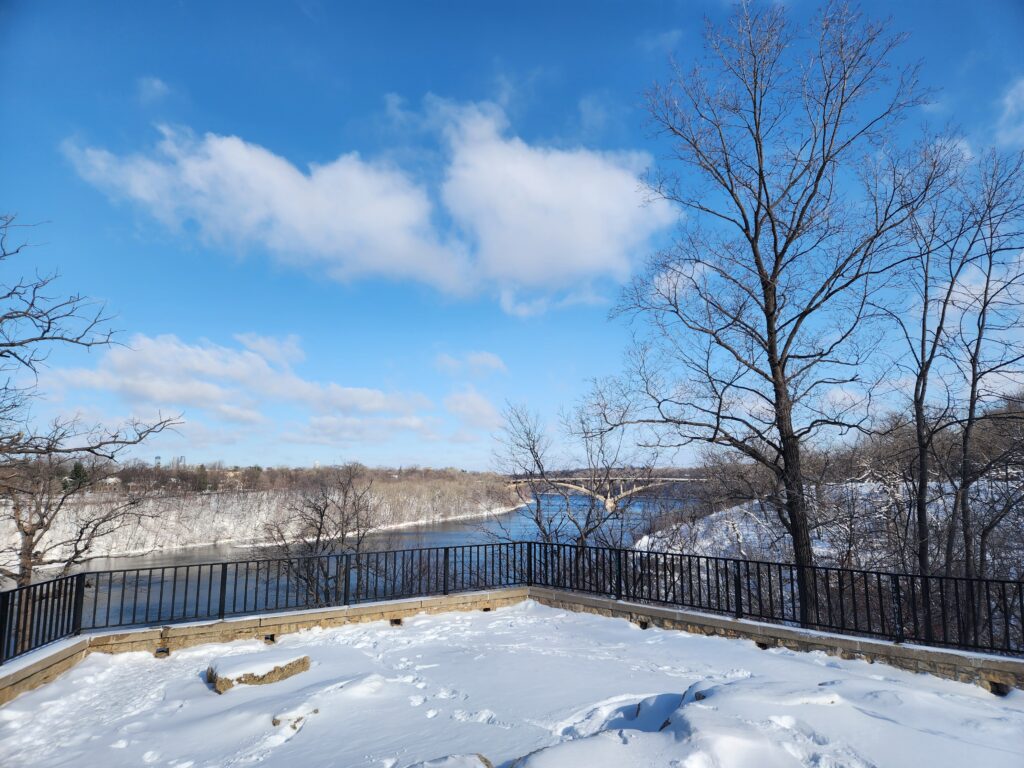
Apocalypse
Under the wind and water hum, I hear
the dull drum beat: dumdumdumdum. It
could be suburbia, the sound is unclear
so I trudge forward, and through the branch-knit
sky—a woodpecker. With no pity, he
chips away at the bark’s gnarled veil,
he uncovers, ends worlds in cacophony.
I follow the sound and ditch the trail.
I think this bird might be a harbinger
of a dying world, bugs filling up lungs,
confessions that I don’t see a future…
Then, from around his skull, he unwraps his tongue.
Each version of myself turns inside out
As the woodpecker cuts holes in my shroud.
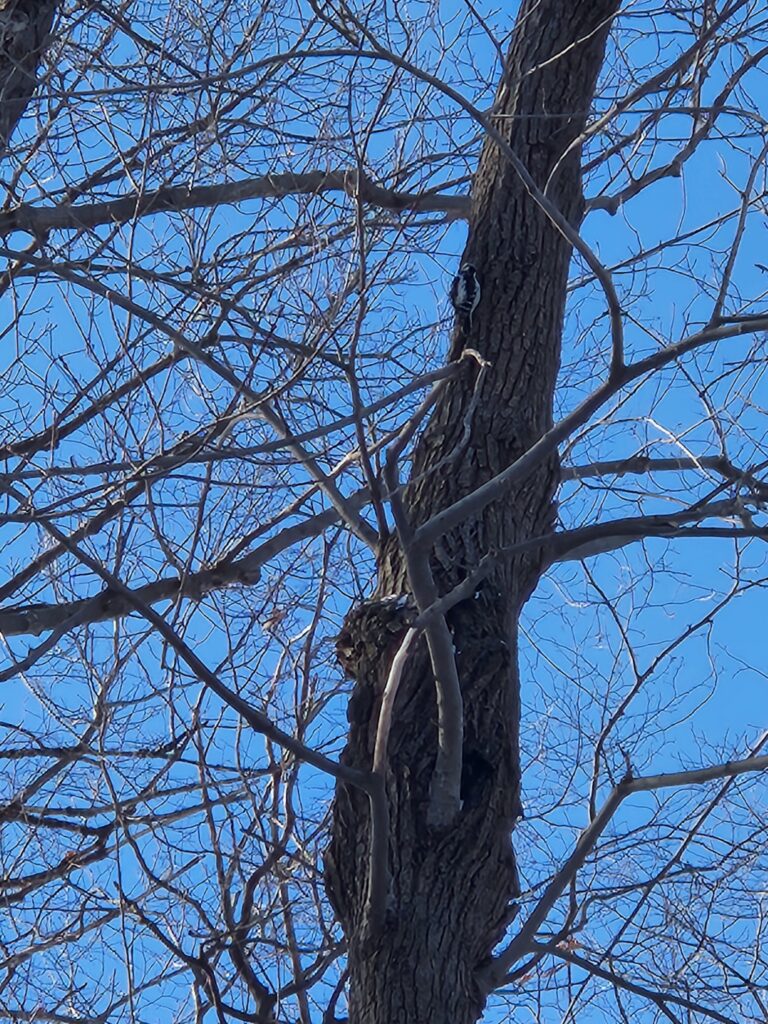
My First Winter in Minnesota Without You
For the three or four fruits that lie in the sun at the top
Of the tree; too ripe for any moment but this
— Jane Hirshfield
Last winter, we clicked heels in the rain and untucked
Ears from hats and animated every walk
To the corner store with joking gestures,
Pushing each other into snow like children
And grasping at each other before
Ice patches and puddles like princes.
We sat, folded like flowers, heads touching and cried,
Then got slurpees and laughed until our stomachs hurt,
And before our first night together
You lint rolled your entire apartment
So the cat hair wouldn’t make my eyes itch.
I thought we would never hurt each other.
I thought I would love you forever.
And I might, now
Learn to love you in the exhale,
In the glide of boots on frozen
Pools, in the slip of ink,
In my hand steady against a tree,
and the pear juice on my chin.
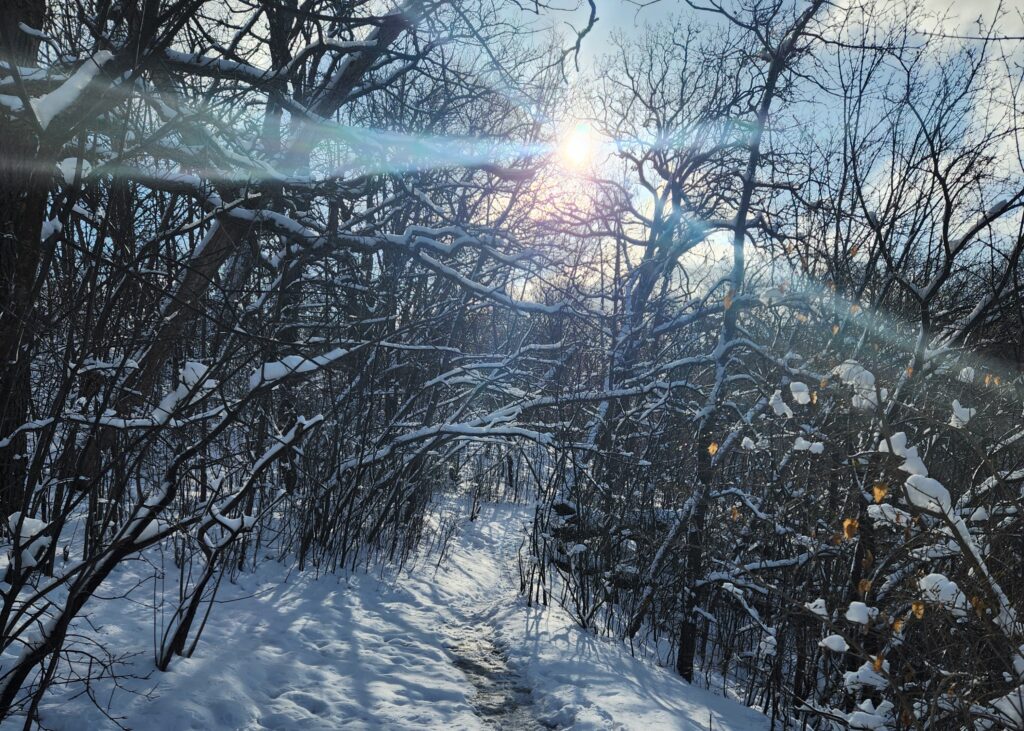
I was nervous introducing my boyfriend to my grandparents. I was worried he would be just as baffled as me by their rules, and they wouldn’t extend the forgiveness the extend to me. (They are my step-grandparents actually, but they’ve been in my life since I was three, and I dropped the “step” title long ago. As much as I’ve integrated into their family, their way of doing things often feels foreign to me. Their ‘family is everything’ attitude, their aversion to conversation about death, their interest in yankee candles and hallmark movies and table manners—It often doesn’t make sense to me and I’m embarrassed to admit I’ve looked down on it most of my life.) My fears were quickly dashed. My grandparents welcomed him instantly, writing down recipes for him and inviting him to all of our holiday dinners for the rest of time.
Six months later, I had broken up with my boyfriend, and I was saying goodbye to my grandfather for the last time. I was worried I wouldn’t know what to say. I was scared that I actually didn’t even know him well enough to say the right thing. At this point, he was in a coma, and I wasn’t even sure if he could hear or understand what I was saying. I got through some clumsy I love you’s, trying to fight back tears. I realized I was thanking him. I thanked him for how he let me into his family, how he never made me feel like I wasn’t his granddaughter. My dad says he saw him stir when I said that, but I’m not sure.
On our last drive to Brigham and Women’s hospital, my mom says death is just a great unveiling, a reminder that everything we think we know is an illusion. It makes sense then, that as my grandfather dies, everything I thought I knew about my parents changes.
Shadow Falls
I’ve followed the pressed
Waffle snow path to the waterfall’s
pleated mouth. White water
Laughs at the precipice,
Flails like willow’s
Weeping limbs,
wild on her way down.
The fall’s impressive wall
Sputters and spits in thin
Strands; like hearing my mother
Cry through thin teal storm walls when
The world bends.
When I first walk into a room, I’m the kind of person who takes a while to observe what’s going on before I decide how I’m going to act. I’m not sure if this makes me a thoughtful character or an anxious and inauthentic one. When I went home, I expected to come back to a room I know so well I can act and speak without a second thought—but, when I arrived, my family had gone crazy with grief.
So now it was time for me to assume my role as a quiet observer. My parent’s room has been converted into a guest room. The walls are now a deep green. My mom has moved into my sister’s old room, and she sleeps in a twin bed. Her walls are decorated with Judy Dater nude portraits and her desk has a new tarot spread and incense stick each morning. It seems my mom’s recent divorce and explorations into mdma and ketamine have turned her into one of those woo woo people we would’ve made fun of a few years ago. In my investigation, I stole a new pair of earrings from her jewelry case.
My mom has always been the youngest mom of all my friends—the one who swears and who’s mysterious past life as a highschool dropout and aspiring Hollywood starlet gave her a little bit more of an edge. She loves anything or anyone counter-cultural but herself is pretty conservative. She had never drank past her limits until her brother’s wedding which my sister and I found ultimately entertaining to watch. She never smoked pot because it made her paranoid. She’s only ever dated drug addicts but has always been too naive to realize it until after the breakup. When the shitty boyfriend of her 20’s was talking to his friends about 8-balls, she assumed they were talking about the fortune-telling magic eight balls. And now she’s a cheesemaker who lives in a quaint farmhouse in rural New Hampshire.
For all of my visit home, I held my feelings in very carefully. People kept asking me how I was. My throat tightened and I said I didn’t know. I barely cried when I got the news about my grandfather dying and I stayed focused on how everyone else was doing. So I search my house for clues about this new world, I buy my sister icecream, and at night, as I try to fall asleep in the guest room, I listen to my mom’s muffled tears through the wall.
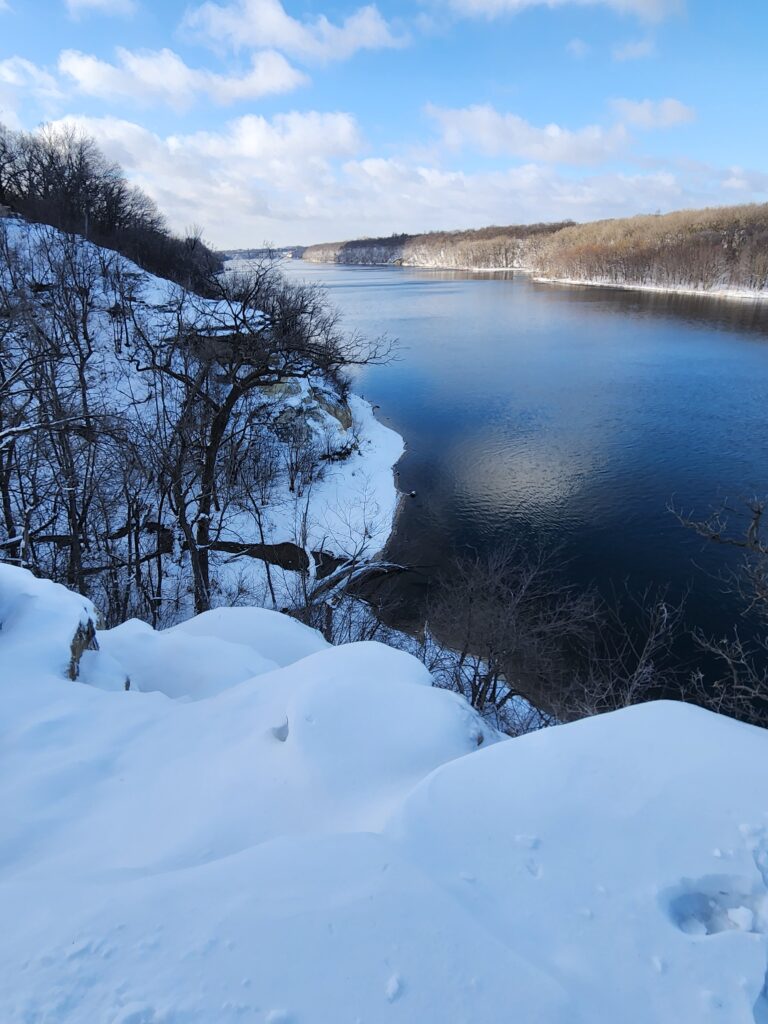
Crossing the Mississippi
I’m going home to New Hampshire where there’s
hills and orange budding lichen. I take
the A-line. It floats, a mechanic snake,
over the Mississippi in mid-air.
I squint into the tangerine-tinged glare
to read the carved initials in opaque
plastic scratchings—reminder of break,
cracked stream bed, another father’s affair.
I’m going home, where everything repeats.
The bus jostles back to Earth. The two
letter love letter is obscured by one
story houses and the ugly concrete
shopping centers of 46th. I knew
this would end with me completely undone.
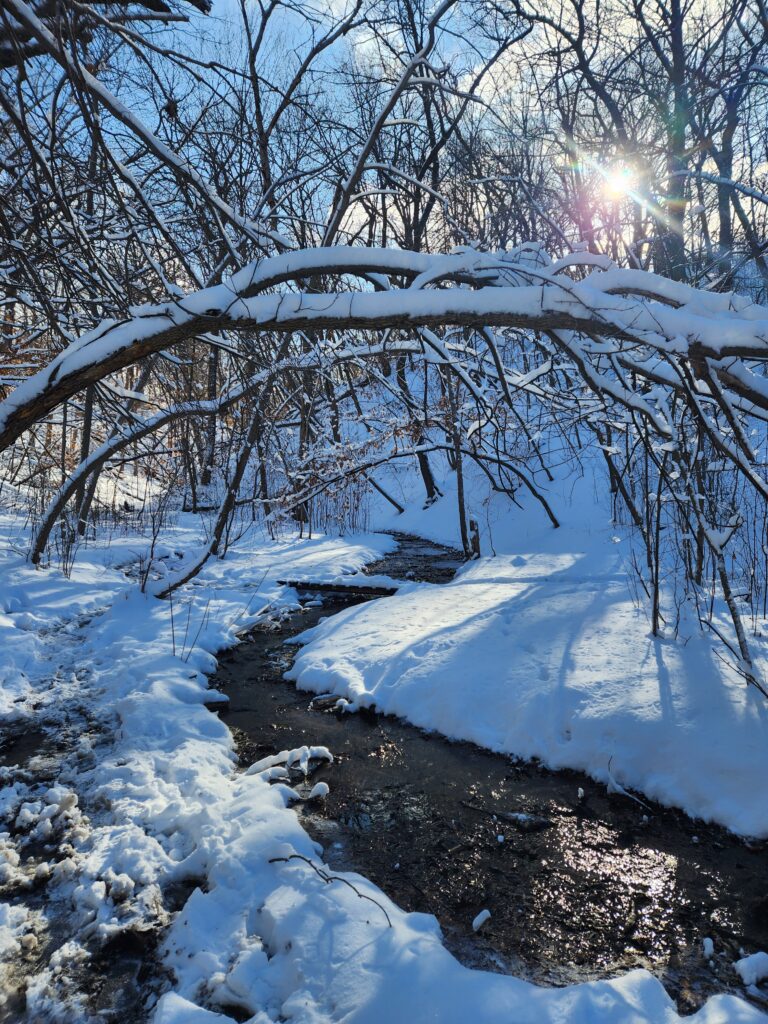
When I was little, I would bundle up and disappear into the forest behind my house. A blue blob weaving and waddling through the woods. I wanted so much to discover something new—a new species or monster or portal—so I would carefully collect clues, memorize tracks and scratches. When I got tired, I would sit under the diamond ruby arches of the sumac swamp and wait for some magical world to trust me with its secret.
It’s Spring now, and I’m 19, and the snow has melted, and I’m sitting on a rock at the foot of Shadow Falls. I still think, but now with less faith than when I was a child, that if I stare at anything for long enough, I will receive some revelation or meaning. I stare at the water crashing onto stone in soapy strands and I don’t experience some sublime awe. The waterfall doesn’t overwhelm or elate. I hear no coded message in the pattern of drips and I make no metaphors out of the scene. I consider that the waterfall, and me watching it, means nothing.
I realize I’m calm. I let the heartbreak, the stories, the thoughts, glide across my palms like a rope, rapidly pulled away from me by the Mississippi river’s current. I hold my attention on a patch of water flowing over grass. The light, fractured by twigs, stays in the same place, as water and grass scatter beneath it.
